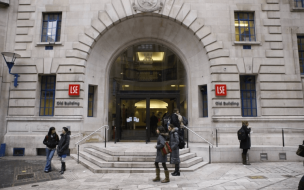CEMS, the global alliance in management education, is celebrating its 30th anniversary. Back in 1988, when the alliance was founded, the world was a very different place.
Michael Jackson and Guns ’n’ Roses fought for the top of the charts, the Berlin Wall was still standing, and the Soviet Union continued to dominate vast portions of the globe. And although it had just experienced its first ever bug, the internet was a barely-known cult phenomenon. Openness was hard to cultivate.
A partnership of academic and corporate institutions dedicated to educating future generations of business leaders, CEMS helped to pioneer the new, globalized world of the 1990s and 2000s. It now has 31 member schools across every continent, 71 corporate partners, and over 13,000 alumni from a staggering 85 countries.
But even though a rise in nationalism is threatening the open and collaborative world that CEMS aims to nourish, threats to globalization have motivated students to take part in the exchange.
“Globalization is at a fragile point where it is make or break, and its success depends on how we promote international business and a global network” says Johan Sciard (pictured below, right), a Global Master’s in Management (GMiM) student at the London School of Economics, and current CEMS student.
“At the same time making sure local needs are being met in terms of employment and economic growth. Being part of the CEMS community gives you a unique opportunity to tackle that.” Johan adds.”
LSE’s GMiM is the only program in the UK that offers the CEMS dual degree. The CEMS Master’s in Management allows LSE students to study at any of the other partner institutions for the second year of their degree.
Celia Iordache, who graduated from LSE this year having completed her CEMS exchange at SDA Bocconi in Milan, echoes Johan's sentiments.
“I think even if countries might be taking a step back, at the end of the day if you work for a private company that’s not your reality. Your reality is working with people across the globe.”
Celia has just joined Costa Coffee as a marketing graduate, and she explains that she works with Portuguese, German, French, and Asian colleagues, day in, day out. “You need to be ready to work with different cultures,” she asserts.
Johan—who is currently on his exchange at ESADE Business School in Barcelona—is on the CEMS student board of representatives for LSE. He’s at the forefront of the alliance, seeking to improve the CEMS experience for students all over the world.
“I’m able to make a difference in terms of sustainability and social responsibility, and also get to meet a huge network of people who I absolutely know will be with me for the rest of my life,” he says.
“What CEMS is helping you do is become a much more responsible leader for the future.”
Johan, who has a background in mechanical engineering and aims to pursue a career in the management side of technology, says he chose LSE’s Global Master's in Managament as it aligned with his ambitions. The global nature of the LSE GMiM classroom—represented by 37 nationalities—is amplified by the CEMS exchange.
Johan adds that it has placed him in an environment where peers challenge each other on everything they believe in. That has pushed him to become a better-rounded individual, both personally and professionally.
“One of the biggest attractions of CEMS is meeting likeminded people - driven, business oriented, and multinational – but who challenge your thinking” he explains.
By combining his Global Master’s in Management education at LSE with the CEMS exchange, Johan feels that he’s been given the best of both worlds.
“The rigorous theoretical approach that LSE offers is vital, but it’s been enhanced by the practical elements around digitization, technology, and innovation gained at ESADE” says Johan.
As well as diverse students and access to a world-class network of universities, the CEMS alliance also gives students the benefit of working with prestigious partners. The CEMS curriculum is designed in collaboration with the partner organizations, which Celia says is more important to businesses than ever.
“It gives you the chance to work with a lot of businesses you wouldn’t otherwise be able to access,” Celia explains.
While on the exchange, Celia led a presentation to directors from Christian Dior, a partner of the CEMS program. Not only did this allow her to develop practical soft skills, it also enabled her to land her current role after graduating.
But even though CEMS helped her land the job she wanted after graduation, Celia says that incoming LSE Global Master’s in Management students should go on the exchange for its own sake. Embracing other cultures can deepen your understanding of business and management, and studying abroad helps develop that knowledge.
“It doesn’t matter where you end up,” she concludes, “it’s about expanding your horizons, having a more global mindset and being more connected.”
Thinking back to the closed world of the 1980s, it’s clear that CEMS and its students have already come a long way.








